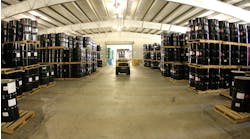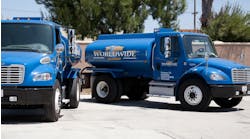Chemical superheroes: Bulk motor carriers unite in support of ACC’s Responsible Care
The science of chemistry unlocks world-changing power.
It’s responsible for everything from the plastics found in countless goods to the liquid-crystal displays clutched in countless hands; and, in the commercial vehicle realm, lightweight materials, lithium-ion batteries, and carbon-capturing technologies.
But with this great power comes a great responsibility to operate safely, a duty shared by every chemical supply chain stakeholder, from manufacturers to their logistics providers, terminal operators, equipment suppliers, and tank truck carriers—whose drivers transport chemicals over the road as the chain’s most visible link.
“I look at us as chemical superheroes because every day we’re going up against obstacles, with regulations, shipper constraints, highway traffic, and the general public’s perception,” said JoAnne Bricker, vice president of bulk chemical operations at New Jersey-based C Three Logistics. “There are so many challenges our drivers face every day, so when you advocate for safety, it gives them peace of mind.”
The same goes for all the industry’s employees, as well as those who depend on its products and services every day. That’s why leaders in the space commit to a “code of honor” known as Responsible Care—an American Chemistry Council (ACC) initiative aimed at improving environmental, health, safety, and security (EHS&S) performance.
And if ACC members and their Responsible Care Partners are heroes, program award winners are the industry’s Justice League.
This year’s exemplary group features Responsible Care Partner Company of the Year Highway Transport, New Company of the Year Quantix In-Plant Services, and Partner Company Employee of the Year Tanya Rogers, Quantix’s corporate compliance manager who’s also one of the program’s most ardent supporters.
Understanding that secure, sustainable chemical operations go hand-in-hand with successful driver recruitment and good business practices when companies act responsibly, they’ve joined with ACC’s Greg Rhoads, Dow’s Lori Pavlish, and many other chemical supply chain participants—including C Three, Dana Transportation Companies, and Quick-Way—to champion a cause that perfectly aligns with National Tank Truck Carriers’ safety mission.
The crossover is undeniable. NTTC’s newly crowned North American safety champions, Service Transport Company and Lacy’s Express, both are longtime Responsible Care Partners. “Safety people in the motor carrier industry are special,” Rhoads said. “They really care. You’re not successful if you don’t. Drivers can sniff that out right away.
“You have to care, you have to share—and you’ve got to keep getting better.”
Responsibly rooted
The Responsible Care program, now practiced in 68 economies around the world, started in 1985 in Canada as a voluntary chemical-industry initiative in response to the Bhopal incident in India, as well as public pressure for improved performance. ACC introduced Responsible Care in the United States in 1988, and expanded it to include chemical supply chain partners in 1994.
The industry’s trade association offers numerous programs and actively addresses chemical manufacturers’ interests in several areas, including energy policy, trade, and taxation, and its 150-plus members, like Dow, Huntsman, and SABIC, can participate as much or as little as preferred—with the exception of Responsible Care. “Our members must, as an obligation of membership, implement Responsible Care in their operations and complete the certification obligations and metrics reporting,” said Rhoads, a consultant, and former Responsible Care coordinator for CSX, who has managed ACC’s Responsible Care Partner program since 2016.
Responsible Care companies pledge to operate by a set of 12 ‘Guiding Principles’ that include acting “in ethical ways that increasingly benefit society, the economy, and the environment;” instilling a culture that seeks to “identify, reduce, and manage process safety risks;” working with governments and organizations to develop “effective and efficient” EHS&S laws, regulations, and standards; and seeking “continual improvement.”
Responsible Care works because it “stays fresh,” Rhoads contends, constantly evolving to meet stakeholder demands, and the numbers confirm. According to ACC, Responsible Care companies, who voluntarily track process safety incidents, have reduced their occurrence by 56% in the last 22 years (as of January). In addition, Responsible Care companies have a worker safety rate that is five times better than the U.S. manufacturing sector as a whole; and, from 2010 to 2020, they reduced recordable injury and illness rates by 30%, and NOx emissions by 41%.
Results that “blow your hair back” are what Pavlish, Dow’s senior transportation safety and security manager, points to when people ask her if Responsible Care is significant. “You have to be able to prove and defend every one of these numbers,” she said. “We report our metrics every year. So it’s real. This isn’t something we imagined.”
Along with tracking and reporting EHS&S performance, Responsible Care companies must certify their conformance to ACC’s Responsible Care Management Systems (RCMS) framework, using one of two options known as RCMS or RC14001, through third-party audits, and implement prescribed product safety, process safety, and security codes. The goal of every Responsible Care observer is the same—to reduce risk by refining processes—but the implementation of each management system looks different for every company, Rhoads said.
“It’s a program ACC built and designed for everyone, but the key is making it fit within your existing organization,” said Barbara Wood, Responsible Care and marketing manager for Michigan-based Quick-Way, a multiple NTTC Grand Award winner and recipient of numerous safety, service, and sustainability awards from Dow. “There are so many nuances within every organization, so you have to think about how this program is going to fit and intertwine with your business, and the way that you are positioned, not only in your community, but within your competitive area, with what you do, and the people who are involved.”
But, Rogers maintains, practicing Responsible Care isn’t as daunting as it sounds.
“Once you implement a program and get it going, it runs in parallel with your existing EHS&S programs,” she said. “The Responsible Care requirements and procedures just go a little beyond what’s already regulatorily required, better protecting the environment, and the health and safety of our people. So it’s not as burdensome as some may think because it’s embedded into our daily requirements.”
Caring collaborators
ACC’s Responsible Care Partnership program includes 96 companies across nine sectors.
Responsible Care Partners don’t make chemicals but play a key role in the industry’s supply chain, either hauling raw materials in, moving intermediate product out, or storing or delivering finished products to the market. All eight U.S. Class 1 rail carriers are Responsible Care Partners, as are many logistics management providers, like Odyssey Logistics & Technology and Schneider Logistics, terminal operators, like Savage Companies, and inland marine operators, like Kirby Corporation.
Bulk motor carriers are the largest sector, with 43 participants—or 44.8% of Responsible Care Partners—a point of pride for the entire industry, professes Rick Lusby, Highway Transport’s VP of safety and quality. “We haul hazardous materials through towns and neighborhoods, so we do everything we can to protect the people we’re around,” he said.
Still, insists Gene Patten, the tank truck contingent could be bulkier.
Dana’s VP of safety and compliance, and corporate Responsible Care coordinator—who last year guided Dana subsidiary Suttles Truck Leasing to the first Heil Trophy for a private fleet—points out that NTTC contains 250 for-hire carrier and private fleet members, and unfortunately, not all bulk carriers are in the association. “It would be great to have all bulk motor carriers in NTTC subscribe to the ACC Responsible Care program,” Patten said.
That’s because ACC members, and their Responsible Care Partners—who, essentially, are an extension of their operations—must conform to the same set of codes and principals, which isn’t always appreciated, Pavlish asserts. “It’s a jungle out there for carriers,” she said. “So every benefit we can give these drivers and driver managers, in terms of protecting their assets and their people … is super important.”
A Responsible Care committee, consisting of ACC members and Responsible Care Partners, and an RC Partner leadership group, keep everyone in concert. Patten, a two-time RCP Employee of the Year, is one of five Partner representatives on the Responsible Care committee, and he chairs the Partner leadership group, which includes Lusby and Rogers. “Gene listens well, processes information, and invariably comes up with great ideas and advice,” Rhoads said.
Through their participation, Responsible Care companies form a united front—and set the bar for safe, secure operations. “We want to lead the industry in doing the right thing, from an environmental perspective, and in how we safely handle these products, and we take it very seriously,” said Chris Ball, Quantix president and CEO.
Exemplary enterprises
Bulk motor carriers have claimed Responsible Care superlative awards each of the last five years.
Highway Transport leads the charge with three Responsible Care Partner Company of the Year honors in the last four years. “It’s an awesome accomplishment for everybody at Highway,” said Marshall Franklin, Highway Transport president and CFO. “We’ve been around nearly 75 years now. It’s a family-owned business, and we have a lot of good people who always want to do the right thing for each other in general, but to formalize that, put it into a program, and then receive recognition from people who don’t know us is very satisfying.”
Franklin said Lusby deserves much of the credit, for supporting and furthering industry causes—and simply completing the award application, which they didn’t always do. Highway Transport also recently added temperature tracking to its tank trailers, hired a VP of information technology, and invested in a software platform (Salesforce) to manage its sustainability efforts. “We were actually their first trucking client,” Lusby said.
Quantix boasts one of the most unique Responsible Care resumés.
As part of its push to combine all acquired operations, the supply chain services company in January added liquid and in-plant certifications to its Responsible Care Partner dry bulk, and warehouse and packaging programs. The in-plant certification for activities inside a customer facility, achieved with Kuraray’s help, was the first for an RC company.
In addition, Quantix this year claimed Responsible Care Facility Safety awards in its dry bulk, liquid, and in-plant services divisions, and last year committed to participating in a new certification program for Operation Clean Sweep members called OCS Blue, which compels participating companies to manage, measure, and report unrecovered plastic releases. To support that initiative, Quantix is implementing infrastructure practices to prevent pellets from escaping through open dock doors and drains at its distribution centers.
Ball says the company’s EHS&S success is due to the hard work of Dionne Quiachon, Quantix’s chief EHS&S officer, and Rogers, who helped Quantix achieve Responsible Care liquid and in-plant certifications in less than 12 months. Rogers also won an RCP Employee of the Year award in 2019 with WSI subsidiary Material Logistics & Services.
“For me, it’s a big deal,” Rogers said. “It’s very encouraging. I’m trying to make a difference, and as someone who is on the younger side, and a female in this industry, sometimes it’s tough to know if you are, and things really are changing for the better.”
Also since 2018, Eagle Transport president and CEO Lance Collette, and Martin Transport’s Cynthia Champion won Employee of the Year awards, and Eagle was a Responsible Care Partner Company of the Year. “When those announcements come out, I make sure our leadership, and procurement and operations guys, see them,” Pavlish said. “I want them to appreciate the investment these companies are making in their management and safety programs.”
‘Shopping’ shippers
All of Dow’s “core,” high-volume carriers must be Responsible Care Partners, Pavlish said. And when procurement asks her about a prospective new partner, the first thing she does is peruse the Responsible Care Partners page. “That’s our shopping list for carriers,” she said.
As a trade association, ACC can’t force members to transact only with Responsible Care Partners. That’s illegal. “But we work hard to encourage them to recognize the value certified Responsible Care Partners bring,” Rhoads said, while also acknowledging, at times, a disconnect divides CEOs and safety leaders from their logistics coordinators. Petrochemical companies will say they don’t work with non-Responsible Care Partners, Ball added, but he isn’t certain that’s always the case, especially with a driver shortage making some “less picky.”
Lusby and Patten concur, saying ACC members want their supply chain collaborators to participate in Responsible Care but don’t always demand it. However, they increasingly need Responsible Care Partners as they’re mandated to account for the carbon footprints of their entire supply chains. “There is pressure on the industry to lead on environmental stewardship, and this is one thing they can point to and say, ‘We subscribe to this, and here’s how we do it,” Ball said.
Pavlish affirms sustainability is top of mind for ACC members, and Wood sees the evidence, with more shippers inquiring about Quick-Way’s green goals “in an effort to meet their sustainability goals.” That’s why incorporating the new ‘S’ (for sustainability) in EHS&S is one of Rhoads’ most pressing priorities, along with addressing cybersecurity. “This year, our challenge is bringing Partners into this, and learning from them.” he said. “We know they’re doing remarkable things around energy efficiency, reducing GHGs, water usage—all of that.”
Just rewards
While Rhoads can’t guarantee any increases in revenue after Responsible Care incorporation, he believes a focus on safe operations can contribute to a strong bottom line. “You can’t scrimp on safety and doing the right things,” he said. But for those unswayed by ethical obligations, there exists many other excellent reasons for Responsible Care Partner evolution.
Ball suggests certification does serve business purposes, including marketing and public relations. Quantix doesn’t need to convince clients it cares because its performance is certified; and he hopes their commitment helps to mitigate negative public perceptions fueled by hot-button issues like microplastic pollution. “Quite frankly, some of our competitors have given the industry a black eye by not handling plastics properly,” he said.
Franklin also perceives real value, calling Highway Transport’s extensive involvement an investment in its future. “I’ve had multiple conversations with companies we don’t do business with today who’ve said, ‘It’s fantastic you won that award, and we want to do business with companies that value Responsible Care,’” he said.
Pavlish is a proponent of establishing “business continuity plans,” and putting best practices and procedures on paper—as required by Responsible Care—is a way of passing on important policies, both for family-owned businesses preparing the next generation, and companies growing by acquisition. “Everybody can’t keep everything in their head in a 1,000-person organization,” Rhoads said. “It won’t work.” Responsible Care also helps struggling companies “jumpstart” safety programs by identifying what is and isn’t working.
But for Pavlish, the program’s “real beauty” is a chance to network with “like-minded people” at conferences and workshops, and benefit from their experiences and perspectives. Those gatherings also provide Partners with the opportunity to learn how ACC members—many of which are among the largest companies in the world, with resources to match—are running their safety and security programs.
“It’s nice to see what other people are doing, and how they’re addressing issues, like with fall protection, respirators, and industrial hygiene monitoring,” Rogers said. “We might be struggling with something somebody else has down to a science, so it’s a fantastic opportunity to share best practices—and partner to drive change.”
Up to spec
Carriers achieve Partner status by meeting technical specifications for one of ACC’s two management systems, and hiring a third-party auditor to certify their achievements. RC14001 is based on ISO standards, while RCMS isn’t. “Members and Partners select from those two,” Rhoads said. “We make no distinction between them. In our eyes, they’re equal. They cover the same materials and requirements.” The only real difference, he said, is RCMS calls for triennial recertification, while RC14001 necessitates annual audits.
Rhoads said approximately 60% of ACC members, and 95% of Partners, choose RCMS, depending on what their stakeholders expect. “We have members selling products into Europe or the Far East, or the automotive industry, where 14001 is required for their suppliers,” he said. “But the vast majority of our Partners don’t have that requirement.”
The most challenging aspect of certification is “gap analysis,” or scrutinizing what’s in place now, comparing it the “tech spec,” and bridging the gap. Rhoads emphasizes that doesn’t mean throwing everything out and starting over, but building onto current programs, and exchanging “people-based” systems for recorded policies and procedures. As Rogers warns, “If you didn’t document it, you didn’t do it.”
A key task for bulk carriers is evaluating risk to people and establishing controls to safeguard them. “There is a full-on risk assessment process, site by site, and company-wide,” Franklin said. “So we ask, ‘What are our safety policies and procedures? Do we have incident-reporting practices where we document a spill at a customer site, and what does our policy say to do? Do we perform a root-cause analysis, where after we address the emergency and everyone is safe, we go back and say, ‘How can we prevent this from happening?’”
RCMS members and Partners who joined before a 2019 rule change recertify on the same three-year cycle, creating a “crunch” to schedule audits with one of ACC’s 12 approved providers, and this is Year 3. Highway Transport recently finished auditing the required 33% of its covered facilities, Quantix’s latest audits—six dry bulk terminals and five warehouses—are underway, and Quick-Way is eying July. Companies that enlisted after the change, like C Three, have until the end of the third year after they joined.
Chemical comrades
Considering the plunge? There’s no good reason to hesitate—and no time like the present, Rhoads advises.
“You don’t have to be perfect,” he said. “It’s about getting better.”
Start with checking the ACC’s website and reaching out to chemical supply chain companies. Talk to peers in the carrier community, and customers who are involved, and ask them about the program, and its power.
Then seek a sponsor’s support prior to meeting with Rhoads and his team. Patten and Pavlish, who’ve advocated for dozens of prospective Partners, are ideal candidates. Pavlish backed Quantix’s liquid application at the request of liquid chemical president David Perry; and Patten, one of C Three’s sponsors, calls backing industry associates “an honor and privilege.”
“Anything I can do, through Dana (the 2012 Responsible Care Partner Company of the Year) and the ACC Responsible Care program, to improve transportation safety, is a plus for our industry,” he said.
Bricker’s first move after leaving Quality Carriers to launch C Three’s bulk division was to seek Responsible Care certification, and she says the support she’s received is “overwhelming”—making the pursuit of Responsible Care partnership easier to pull off.
“It’s a little bit of a challenge, with the time and resources required to do it—but ultimately, it’s worth it,” Ball concluded.










